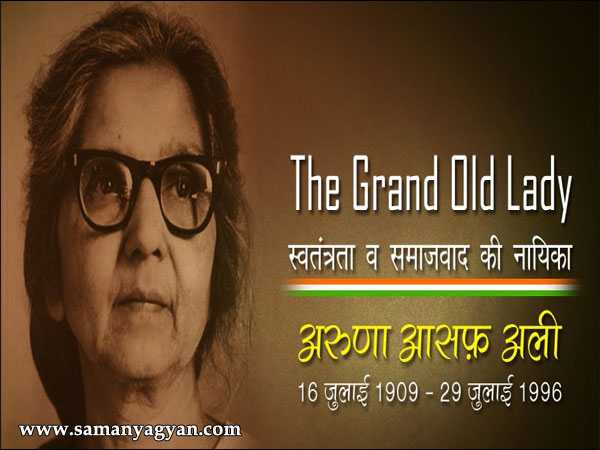Aruna Asaf Ali was born on 16 July 1909 in Kalka, Punjab, British India (now in Haryana, India) into a Bengali Brahmin family.[2] Her father Upendranath Ganguly hailed from Barisal district of Eastern Bengal (now Bangladesh) but settled in the United Province. He was a restaurant owner. Her mother Ambalika Devi was the daughter of Trailokyanath Sanyal, a renowned Brahmo leader who wrote many Brahmo hymns. Upendranath Ganguly's younger brother Dhirendranath Ganguly (DG) was one of the earliest film directors.[3] Another brother, Nagendranath, was a university professor who married Nobel Prize winner Rabindranath Tagore's only surviving daughter Mira Devi.[4] Aruna's sister Purnima Banerjee was a member of the Constituent Assembly of India.
Aruna was educated at Sacred Heart Convent in Lahore and then at All Saints' College in Nainital. After her graduation, she worked as a teacher at the Gokhale Memorial School in Calcutta. She met Asaf Ali, a leader in the Congress party, in Allahabad. They got married in 1928, despite parental opposition on grounds of religion and age (he was a Muslim and her senior by more than 20 years).[5]
My father was no more when Asaf and I married in September 1928. My paternal uncle Nagendranath Ganguly, a university professor who regarded himself as my guardian, said to relatives and friends that as far as he was concerned I was dead and he had performed my shraddh.[6]
July 16, 1909-July 29, 1996
Aruna was an active member of the Congress Party.
She had participated in public marches during the Salt Satyagraha.
29 July 1996
(aged 87)
New Delhi, Indi
International Lenin Peace Prize (1964)
Jawaharlal Nehru Prize (1991)
Padma Vibhushan (1992)
Bharat Ratna (1997)

